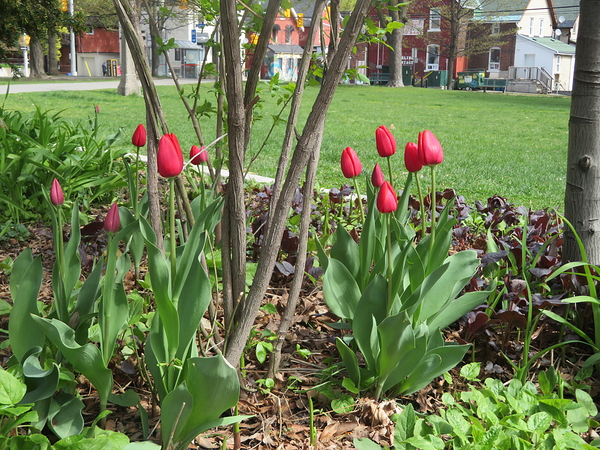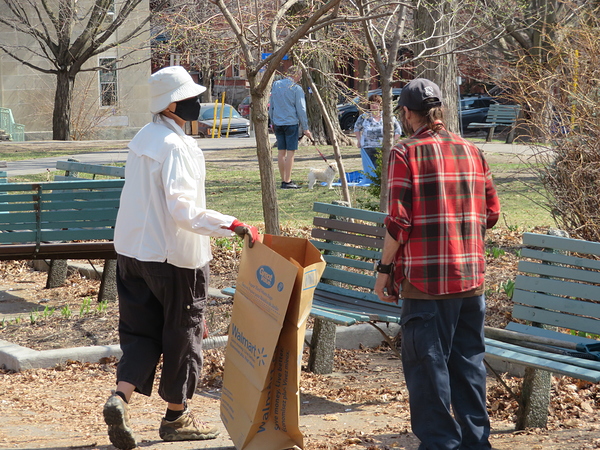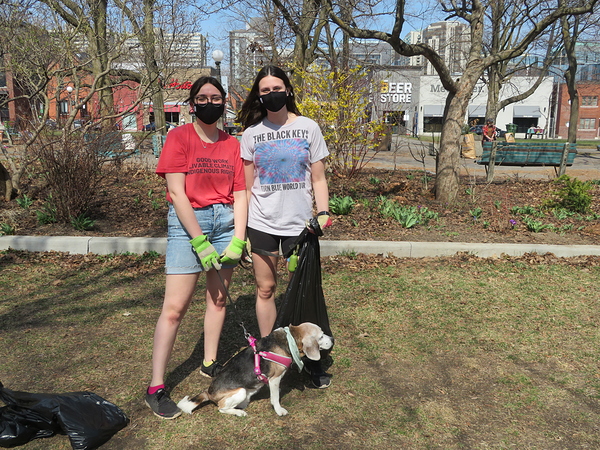
Stephen Thirlwall
There were no formal Earth Day celebrations in Dundonald Park in April for the second year in a row.
Perhaps, before we hold any further festivities, we should ensure that we have undertaken meaningful steps toward cleaning up, improving and better managing our environment, so we have something definite to celebrate. Or is this work itself the real act of celebration?
Sound practices
While stopping our big event, the pandemic has forced us to be more aware of our local environment and to consume and waste less, and rely less on the automobile. It has also encouraged some individuals to engage in small efforts to improve our environment.
People in homes with front- and backyards have been planting new gardens or extending old ones with flowers, herbs, fruits and vegetables over last year. Plant boxes and large pots have been placed on patios, porches, sunny balconies and driveways. If we can continue these new habits post-COVID, it will make a strong foundation for better maintaining our environment and taking up other sound environmental practices.
Community gardens springing up in Centretown
There is good news in Centretown at the neighbourhood level. The Off-Bank Community Garden on Nepean Street will be able to continue for another season before building construction starts on its current site. Its garden plots were assigned in late April so planting could begin early May.
The Off-Bank garden has proven how temporary community gardens can develop positive relations between the city, the developer, gardeners and neighbours, while producing an abundance and variety of crops and flowers.
In trying to be more proactive, the Centretown Community Association (CCA) Trees and Greenspace Committee (T&G), along with Councillor McKenney, are exploring the possibility of another temporary community garden site on Gladstone Avenue, where a building is to be taken down.
As long as pandemic lockdowns don’t prohibit individuals from working in community gardens, Nanny Goat Hill, the McNabb garden, and the community garden at Lyon and Lisgar in Centretown, as well as the Dalhousie Community Garden on Somerset West and Preston, will likely all be operational.

Other T&G projects are underway. The Dundonald Gardening Group, together with Dundonald’s adopt-a-park hosts, already began initial park and garden cleaning, and tree trimming in early April. This work will continue from spring to fall. Plans are being developed for similarly cleaning and gardening in Minto Park along with its adopt-a-park team. Another garden team will be active at St. Luke’s Park.
On Sparks Street between Kent and Lyon, the Sparks Street BIA is sponsoring eight large (6’ x 6’ x 3’ high) planting boxes. This is an opportunity for a few avid local gardeners to produce food crops. Some of the crop is intended to help feed people downtown who are in need.
The CCA is looking at establishing a small public space (parkette) on Elgin Street as a meeting place for seniors. A CCA working group is also developing a proposal for a new Elgin Street Farmers’ Market to be set up just east of Jack Purcell Park. They are working with city staff and Ottawa Public Health, and seeking vendors.
Another T&G working group is investigating pilot studies into Centretown’s urban tree canopy. They would not just look at trees on street fronts but also on properties. This would help to update city records, check the health and condition of trees, monitor tree removals and new plantings, and recommend locations for further planting. If all goes well, the project could unfold gradually over the next three years.

For a second season, the Dundonald Improvement Group (DIG) is working to deal with the more social aspects of the park, factors that directly affect how the park is used and cared for, or misused and abused. What the group learns in this park can be applied to the management of other city parks. DIG includes representatives from the councillor’s office, police, the Centretown and Somerset West Community Health Centres, other community social agencies and concerned residents living near the park.
To enhance walking and cycling, the National Capital Commission has announced that, from May 3 to June 30, the Queen Elizabeth Driveway from Fifth Avenue to Somerset Street West will be reserved exclusively for active transportation. This closure will apply seven days a week from 8 a.m. to 8 p.m. The temporary closures of streets like Bank Street may happen again this summer.
Downsizing and refocusing our lifestyles
We have all heard the slogan Reduce, Recycle, Reuse but how well do we practice this? Unless enough individuals, community groups and institutions put this into regular and careful practice, not much change will happen and we’ll definitely face environmental crises. To make a significant transformation to protect and improve the environment, an upsurge in grassroots action is necessary.
All citizens need to be aware of, examine their situation and engage in at least simple changes. Main actions needed are to control water use; reduce consumption of throwaway goods; limit heating, cooling and electrical consumption; and move away from the heavy use of vehicles, especially polluters and fuel-guzzlers.
Steadily improving technologies, such as electric and hybrid cars, can make a difference over time. Not everyone may be in a position to change their cars right away. But, by the time this is done, there will be many more environmentally friendly options available. With an electric car, the energy cost per kilometre is far less, pollution is greatly reduced, fewer car parts break down and there are overall cost savings. There will soon be many more charging locations across and between cities.
With new smart thermostats and other meters, we can automatically program control of our heating, cooling and electrical consumption. This has always been possible manually by resetting the dials at certain times to reduce or stop consumption for periods when it’s not really necessary. We can also turn off lights in rooms not being used.
We can shop more carefully, focusing on essentials first and then a small margin of special products. We will always need carrier bags and containers but can avoid the overuse of single-use plastic bags and containers. Many people are now using fabric bags and backpacks, which can be reused many times. We can also reuse plastic bags more than once for multiple purposes before they end up in the trash. T&G has a team looking into ways to reduce our reliance on single-use plastics.
We can also handle our waste better. I found that my small backyard composter processes about 90 percent of vegetable waste and some fall leaves into useful compost. The rest goes into the green bin along with waste from meat, fish and fowl. We can ensure that recyclable paper goes into the black box and we can check with the city to learn which glass, tin and plastic can be recycled and which can’t. The remaining garbage will be mostly packaging and unrecyclable plastics.
We shouldn’t wait for others to do all the work! It takes the participation of a huge groundswell of engaged citizens, each carrying out small individual and group projects, to make a significant impact.
